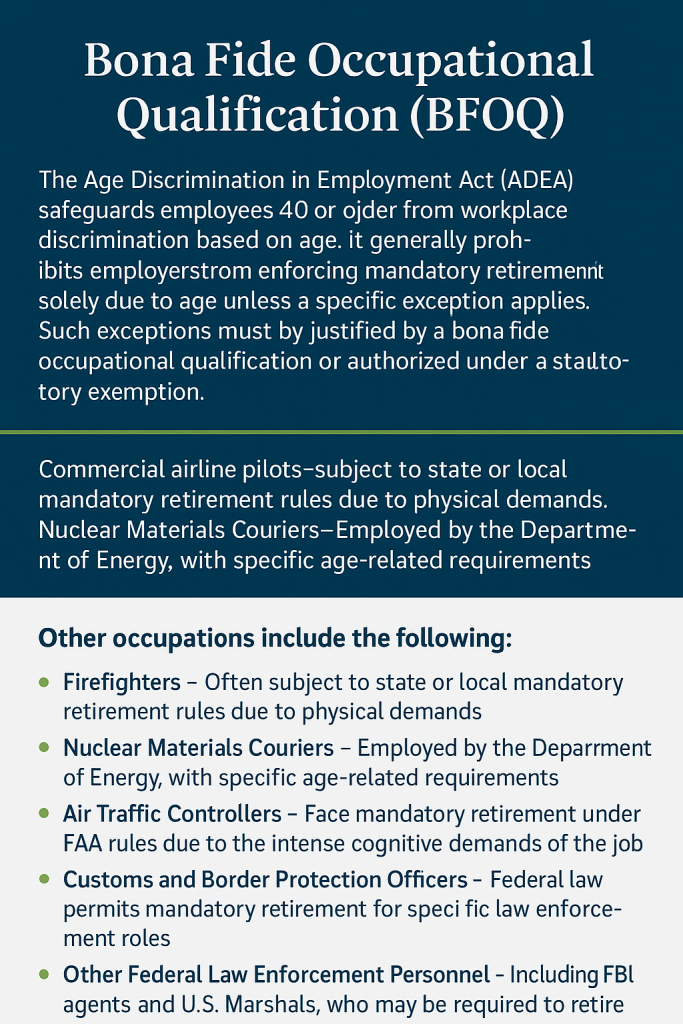A mandatory retirement age can be discriminatory, depending on the context and applicable laws. Under federal law, particularly the Age Discrimination in Employment Act (ADEA), most employers cannot force employees to retire based on age alone. However, there are exceptions in certain occupations—such as airline pilots, some public safety roles, and high-level executives with specific pension benefits—where mandatory retirement is permitted. In general, these retirement policies must be narrowly tailored and legally justified to avoid violating age discrimination protections.
The Noble Law has extensive experience helping employees in North Carolina and South Carolina assert their workplace rights. We consider the big picture while keeping your needs in focus. If your employer is forcing you into mandatory retirement, an experienced workplace discrimination lawyer can help. We are your trusted counsel for workplace disputes.
State and Federal Laws
The legal framework is complex and nuanced, and an experienced employment law attorney must carefully evaluate a policy to determine whether it is legally justified or constitutes unlawful age discrimination.
Bona Fide Occupational Qualification (BFOQ)
The Age Discrimination in Employment Act (ADEA) safeguards employees 40 or older from workplace discrimination based on age. It generally prohibits employers from enforcing mandatory retirement solely due to age unless a specific exception applies. Such exceptions must be justified by a bona fide occupational qualification (BFOQ) or authorized under a statutory exemption.
For example, commercial airline pilots are subject to a federally mandated retirement age due to safety concerns, and high-level executives who are eligible for certain deferred compensation plans may be subject to mandatory retirement under a statutory exemption.
Other occupations include the following:
- Firefighters – Often subject to state or local mandatory retirement rules due to physical demands.
- Nuclear Materials Couriers – Employed by the Department of Energy, with specific age-related requirements.
- Air Traffic Controllers – Face mandatory retirement under FAA rules due to the intense cognitive demands of the job.
- Customs and Border Protection Officers – Federal law permits mandatory retirement for specific law enforcement roles.
- Other Federal Law Enforcement Personnel – Including FBI agents and U.S. Marshals, who may be required to retire by age 57, with some exceptions.
If your employer has implemented compulsory retirement, evaluating whether the policy is based on a legitimate legal exception or merely being used as a pretext to force out older employees is essential. If the circumstances suggest the latter, you may have grounds for a valid employment law claim.
State Laws
In North Carolina and South Carolina, employees are protected from age discrimination not only under federal law but also through state-level statutes:
- North Carolina – The Equal Employment Practices Act (NCEEPA)prohibits age discrimination against individuals 40 or older and applies to employers with 15 or more employees. However, the statute does not create a private right of action, which means that individuals generally cannot file a lawsuit directly in state court under this law. Instead, most age discrimination claims must be brought through the Federal Equal Employment Opportunity Commission (EEOC).
- South Carolina – The South Carolina Human Affairs Law, which encompasses age discrimination protections similar to the Federal Age Discrimination in Employment Act (ADEA), applies to employers with 20 or more employees. Unlike North Carolina, South Carolina provides a state-level administrative process through the South Carolina Human Affairs Commission (SCHAC), where individuals can file complaints. SCHAC may investigate claims and, in some cases, offer remedies or refer the matter for further legal action.
State laws are important because they may offer additional procedural avenues, extended filing deadlines, or remedies not available under federal law, depending on the circumstances of the claim. If you have been terminated based on age, consult with an experienced wrongful termination attorney who is well-versed in both state and federal age discrimination laws.
How The Noble Law Can Help
As an employee, you have certain rights and protections under the law. One of these rights is the right to be free from wrongful termination or the termination of your employment for reasons that are illegal, in violation of public policy, or in violation of your employment contract.
We can help guide you through the often-complex legal process of filing a wrongful termination claim and fight tirelessly to ensure you receive the compensation you deserve for being unlawfully fired.
Actions we can take on your behalf include:
- Evaluate whether your employer’s actions constitute a violation of state or federal employment laws, including those prohibiting age discrimination under the Age Discrimination in Employment Act (ADEA) and relevant state statutes.
- Review the legality of any mandatory retirement policy to determine whether it qualifies under a recognized legal exception, such as a bona fide occupational qualification (BFOQ).
- Advise you on available legal remedies, including filing a formal charge with the Equal Employment Opportunity Commission (EEOC) or, where appropriate, initiating litigation in state or federal court.
Schedule a Consultation with The Noble Law for Trusted Legal Advice
We understand the serious consequences that wrongful termination can have, including financial losses, damage to your reputation, and emotional distress. If you believe that you have been wrongfully terminated from your job, it’s important to understand your legal rights and options.
About The Noble Law Firm
The Noble Law is a women-owned employment law firm with offices in North Carolina and South Carolina, founded by Laura Noble in 2009. Specializing in wrongful termination, workplace harassment, workplace retaliation, workplace mediation, and neutral third-party investigations, the firm is committed to leveling the playing field for employees. Their focus is on delivering positive outcomes with empathy and integrity, while also driving societal change in employment law.
The firm emphasizes diversity, collaboration, and innovation, fostering a balanced work environment that values the personal lives of its staff. With a strong commitment to technology and efficiency, The Noble Law provides personalized attention to a select group of clients, handling cases involving harassment, discrimination, retaliation, and more. The team’s extensive litigation experience allows them to deliver thorough and assertive representation.


